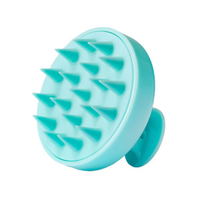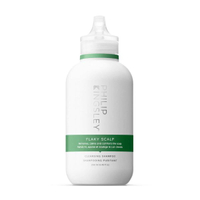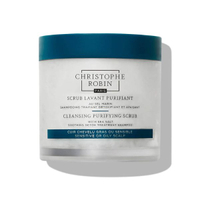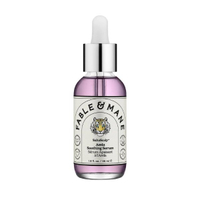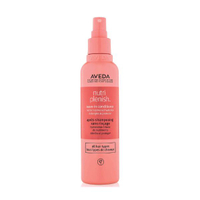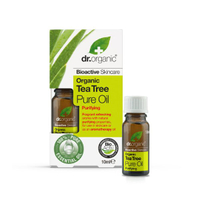Scalp health: 10 at-home treatments to soothe a dry and itchy scalp
Scalp health is the unexpected secret to beautiful, healthy hair


Make your scalp health a priority and combat troublesome dandruff, flakiness and itchiness with these expert-approved treatments you can do at home.
If your scalp is causing you bother and you're noticing premature hair breakage, white flakes of dandruff or it's so itchy you have to scratch, a home remedy or targeted treatment might be exactly what you need to finally bid sayonara to a troublesome scalp. A problem scalp can be due to a number of reasons but the most common symptom is itching due to a lack of natural oils. Dr Munir Somji, Clinical Director of Dr MediSpa, explains, "A dry scalp essentially means your skin is not oily enough, resulting from a lack of moisture. This can appear through scalp irritation, itching and flaking."
Whilst spending a small fortune on scalp health treatments or swapping to the best hair mask might seem like the only option, there are a few affordable home remedies to try before parting with your cash. Here's the treatments the experts swear by.
10 at-home treatments to tackle a dry and itchy scalp
1. Try a scalp massager
Scalp massaging brushes have seen a surge in popularity recently and for good reason. Their soft, pliable bristles work to gently exfoliate the skin without tangling your hair and stimulate the follicles for enhanced blood flow and improved hair growth.
Dr Munir agrees, "A scalp brush manually exfoliates the area, helping to encourage blood flow, reduce build up and ease flaking. They can also help with poor circulation and improving blood flow/follicle nutrition."
Hairburst Scalp Stimulating Massage Brush - £9 | Face The Future
Large flexible bristles won't tangle or tug on strands so this it's perfect for using on wet or dry hair. We love using it in the shower to get a really good lather from your shampoo and deep clean roots.
A scalp brush doesn't need to be expensive but opting for one with larger bristles will minimise any hair damage - they're also great for those suffering from scalp psoriasis as they don't scrape or scratch the skin.
2. Use anti-dandruff shampoo
They may not be glamorous but an anti-dandruff shampoo can make the difference between constant itching and a soothed, healthy scalp. There are lots available on the market but get yours from a Trichologist-founded brand to ensure good quality, beneficial ingredients.
GoodtoKnow Newsletter
Parenting advice, hot topics, best buys and family finance tips delivered straight to your inbox.
According to Dr Munir, "Specialist shampoos target a dry scalp by working to build moisture back into the area. Often anti-dandruff shampoos have added nutrients and richness to help hydrate both your hair and scalp."
Learning how to wash your hair properly with a medicated shampoo can also make a huge difference. Hannah Gaboardi, Trichologist and Viviscal ambassador, agrees, "When washing your hair, you should thoroughly wash every strands to remove product building up as this can cause irritation to the scalp over time. This is one of the mistakes people tend to make."
Philip Kingsley Flaky/Itchy Scalp Shampoo - £25.50 | Look Fantastic
Infused with anti-microbial Piroctone Olamine, a gentle but powerful ingredient that removes dead skin cell build up, balances the scalp and soothes any irritation.
3. Use a scalp scrub
They might seem like a strange beauty gimmick but a good scrub can really improve your scalp health. "Scrubs work to manually remove build up and flaky skin," explains Dr Munir. "They can work really well if those are your main scalp concerns."
We recommend finding one that generates a lather. Non-lathering scrubs can be tricky to rinse out in the shower and without thorough washing, the exfoliating grains can be left behind.
Some formulas are infused with a refreshing menthol or mint extract which can feel lovely if you're after a tingly, cooling treatment and want to know how to get rid of greasy hair but, steer clear of these if you're very sensitive and are worried about causing further irritation.
Christophe Robin Cleansing Purifying Scrub - £42 | Look Fantastic
Work this lathering scrub into damp roots and the small dissolvable grains buff away product build up and dead skin cells. It's not abrasive though and soothes
and itchy, uncomfortable scalp instantly.
4. Try a scalp serum
There are several ways you might be causing damage to your hair and hair thinning, frizzy hair and an itchy scalp are just some of the symptoms you might be left with. Scalp serums target a number of skin issues and dryness or itchiness can easily be fixed by using the right one, consistently.
"Using a scalp serum design for dry scalps is always a good option, this is because the product has been created to target a specific concern, therefore it should hopefully be more effective," explains Dr Munir. "I really recommend finding a good scalp serum."
Fable & Mane Sahascalp Amla Soothing Serum - £32 | Cult Beauty
Applied to parted dry hair, this weightless serum uses hydrating bakuchi, calming aloe vera and nourishing amla extracts to strengthen and rejuvenate a problem scalp.
5. Use leave-in conditioner
Not only are leave-in conditioners a great product for frizzy hair, they also make a good solution for itchy, dry scalps. The deeply nourishing ingredients smooth the cuticles of each hair shaft and enriches dry hair with moisturising properties.
Dr Munir explains, "Leave in treatments work to add much needed moisture into your hair from root to tip. They can add richness which has plenty of time to be absorbed if your hair and scalp are dry and seeking more nutrients."
If your dry scalp is causing you strife, try slathering over a leave in conditioner from root to tip and leaving it to soak in until your next hair wash. Choose lighter formulas as these shouldn't turn the hair greasy or heavy.
Aveda Nutri Plenish Leave-In Conditioner - £31.50 | Selfridges
Spritz this leave-in conditioner at the roots and all over mid-lengths and ends then let it absorb. It will flood the hair and scalp with moisture, reduce irritation and make your hair stronger with long term use.
6. Try tea tree oil
As a natural alternative, tea tree oil can be fantastic for improving your scalp health. "It's anti-bacterial and can effectively work to unclog and cleanses your scalp of build-up and flakes," says Dr Munir. "In addition, tea tree oil is incredibly soothing, so it can calm irritation whilst also working to reduce dryness, helping your hair to be luscious and healthier."
It has a strong scent so if this bothers you, we suggest applying the oil to the roots of your hair, covering the hair with a silk hair wrap and leaving it to work overnight. You won't need a lot as a good, pure tea tree oil is very potent.
Dr Organic Tea Tree Pure Oil - £6.99 | Holland & Barrett
If you have sensitive skin we recommend doing a patch test before applying this all over the scalp. It can be irritating for some but many actually find it incredibly soothing. It's a great natural remedy that purifies the skin and improves scalp health.
7. Apply a DIY hair mask
"DIY hair masks can be made from ingredients readily available at home whilst also providing an often easy remedy to a haircare concern," explains Dr Munir. "DIY masks which I think are worth trying include using yogurt on the scalp, mixed with some lemon juice, as the proteins from the yogurt along with the acid from the lemon work to both exfoliate the scalp whilst providing it with rich nutrients."
Try and leave your mask on for as long as possible to get the best results. "Leave your DIY mask on your hair for at least half an hour, then make sure you wash it out thoroughly with a mild shampoo," says Dr Munir. Ensure there's no mask left on your hair as residue can turn sour and damage the hair structure.
8. Apply coconut oil
Hailed as a natural beauty superhero, one use for coconut oil is that it can be used to oil the scalp as well as the skin. Hair oiling goes back a long way, originating in India over 3000 years ago.
"Oiling the scalp is very popular in India," says Trichologist Hannah Gaboardi. "It helps to stimulate hair growth and shine. It also hydrates the hair follicles from their core structure and prevents dryness and flakes. I normally recommend oiling the scalp once or twice a week."
"Working melted coconut oil directly into your scalp as part of your normal haircare routine offers instant nutrients to a dry scalp," Dr Munir explains. It's full of natural saturated fats which can help to soothe inflammation, moisturise and rehydrate the skin but it can cause spots if used too frequently. "A little goes a long way with this method but also could not work for everyone," he goes on to say. "Due to its richness, it may clog your pores rather than cleanse them, so bear this in mind why trying out this potential scalp treatment."
9. Try hair slugging
Much like skin slugging, hair slugging involves saturating the hair with a hydrating product, leaving it to soak then rinsing out, in order to restore hydration. Some dispute that this technique actually works to fix a problem scalp but it might be worth a try if your scalp is particularly dry.
"Hair slugging is a recent beauty trend where you seal in all of your haircare with a heavy occlusive, often a hydrating product which forms a protective barrier to prevent moisture loss over the hair," explains Dr Munir. "However, it is often encouraged to use hair slugging for the bottom half of the hair, instead of the scalp."
'Slugging' the scalp might result in breakouts in this area as heavy products can often clog the pores. If you do notice pimples appearing, use a gentle shampoo to rid your hair of product build-up.
10. Use apple cider vinegar
"Apple cider vinegar has natural antibacterial and anti-fungal properties, meaning it is effective for skin disorders such as dandruff," explains Dr Munir. "It is also an anti-inflammatory so it can work to calm the skin whilst lightly exfoliating the area."
It's recommended that you don't apply ACV direct to the scalp in its pure form, however. Dr Munir suggests diluting it first, "You should not put it straight onto your hair, as it is far too acidic. Always dilute it with water before using this as a scalp treatment. I recommend one part vinegar to five parts water."
To make it easy to apply, pour your solution into a spray bottle. This will give you maximum control over how much you're applying and where.
What does it mean when your scalp is very itchy?
"There are several reasons as to why you might have a dry, itchy scalp. Whether this be a change in diet, hormonal imbalance, lack of vital nutrition or exposure to cooler temperatures," says Dr Munir.
More commonly though, Dr Munir explains how it might be down to your haircare routine, "A dry scalp can be caused by the haircare products you are currently using - when they do not agree with your skin they can cause a reaction. Similarly, if the products you are using are drying out your scalp or if you are washing your hair too often, it can have the same effect on your scalp health."
Trichologist Hannah Gaboardi agrees,"An itching or dry scalp can be a sign of an improper hair regime, such as insufficiently feeding the scalp with hydration and nutrients or not shampooing or conditioning the hair properly."
We suggest swapping your products for ones dedicated to improving scalp health and upping your intake of healthy fats to see if this improves the condition of your scalp.
When should I be concerned about an itchy scalp? Seeking medical help
It's important to speak to a professional if the itchiness doesn't go away in a few days and is accompanied by hair loss, pain, sores, or intense itching. An itchy scalp due to a fungal infection, lice, and some other conditions won't go away without medical treatment.
"Scalp health is important for both comfort as well as contributing to the health of your hair," says Dr Munir. "Our scalps are a delicate area of our body, with sweat glands and hair follicles as well as a lower skin barrier function, therefore we need to be aware and use tailored hair care for any issues."
"If over the counter treatments are not working, this may be an indicator that you have a different skin condition which needs proper treatment," suggests Dr Munir. "This can include conditions such as eczema, psoriasis or a fungal infection. Each of these concerns need a medical professional to advise on treatment."
Trichologist Hannah Gaboardi agrees: "A healthy scalp should be clear of flakes and irritation or redness and it should be free of dryness, or any signs of infection or damage of the skin on the scalp."
Video of the Week

Emma North is a Senior Beauty Writer who works for digital titles including woman&home, Woman, Woman’s Weekly, Woman’s Own, Chat and GoodtoKnow. Emma’s career in beauty journalism began with internships at publications including Vogue, Elle, The Telegraph and Glamour while she undertook a degree in journalism. She was then taken under the wing of Funmi Fetto, Contributing Beauty Editor at Vogue where Emma assisted with Funmi’s debut beauty book, Palette
